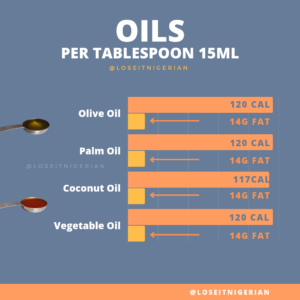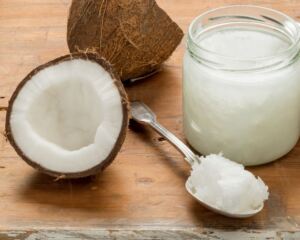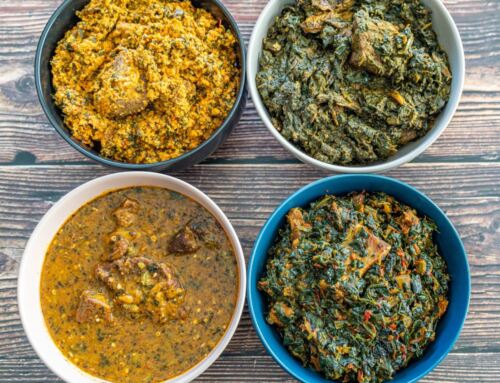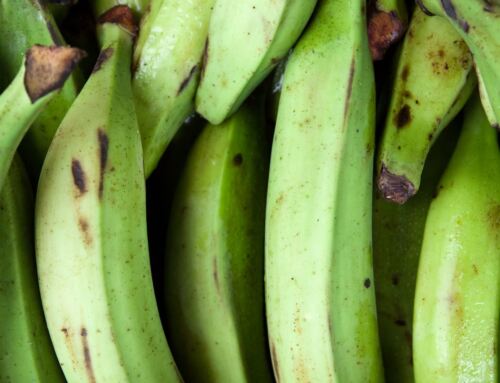Palm Oil vs Coconut Oil: Which Is Better for Nigerian Cooking?

Both palm oil and coconut oil are common in Nigerian cuisine. Many people may be wondering which oil to choose for cooking as part of a healthy lifestyle. Some have even ditched palm oil for Olive oil.
Palm oil is a good source of vitamin E and carotenoids, which are both antioxidants. On the other hand, coconut oil contains medium-chain triglycerides, which may promote weight loss.
Overall the choice of which oil to use will depend on your overall diet and lifestyle, as well as your personal preferences.
This article will provide an overview of both oils, including their impact on health and uses in cooking.
What is Coconut Oil?
Coconut oil, as you would assume, is from the flesh of coconuts (Cocos nucifera). It is a popular oil in Asia, Central America, Africa, and the Caribbean due to the abundance of coconut palms in those regions.
Interestingly, this type of oil is a contender for the world’s oldest oil, having been used for about 4,000 years.

Types of Coconut Oil
There are several types of coconut oil on the market today. Most can be broken down into two categories: Unrefined and refined.
Unrefined coconut oil is made by pressing the oil out of the flesh of the coconut. After manufacturers extract the oil, they do not process it or add any preservatives to it. Since it is not processed, it has a very strong coconut flavour and aroma. It also has a lower smoke point (350°F), which means that it isn’t suitable for high-temperature cooking or baking.
Refined coconut oil, in contrast, is processed to make it more stable and suitable for cooking. The oil is typically purified to remove unwanted gums and free fatty acids. Manufacturers also deodorize it so it does not have as much coconut flavour or taste. Processing helps to prevent rancidity and gives the oil a higher smoke point of about 400–450°F. This means that refined coconut oil is better suited to high-heat cooking and baking.
Potential Benefits of Coconut Oil
Medium-Chain Triglycerides (MCTs)
Coconut oil is different from many other sources of saturated fat because it is rich in MCTs. In general, saturated fats are either classified as long, short, or medium, based on the length of the fatty acid chains.
Unlike long-chain fatty acids, MCTs are absorbed in the gastrointestinal tract and taken directly to the liver instead of circulating in the bloodstream. Therefore, MCTs may not be deposited in adipose (fat) cells as easily.
Researchers have found that MCTs may increase how many calories you burn at rest. This may promote weight loss or the maintenance of a healthy body weight.
Furthermore, MCTs can also play a role in reducing hunger. Your body can use MCTs to form ketones, which may reduce hunger signals or lower the amount of the hunger hormone (ghrelin) that you produce.
Antioxidants
Coconut oil contains several types of antioxidants which help to neutralize free radicals and prevent damage to our cells. The antioxidants in coconut oil, such as polyphenols and tocopherols, have anti-inflammatory properties.
Reducing inflammation is important because researchers have linked chronic inflammation to many chronic diseases, such as diabetes, cancer, and cardiovascular disease.
Nutritional Breakdown of Coconut Oil
The following are the nutrients in 1 tablespoon (13.6 g) of coconut oil:
- Energy: 121 kcal
- Protein: 0 g
- Fat 13.5 g
- Saturated fat: 11.2 g
- Monounsaturated fat: 0.9 g
- Polyunsaturated fat: 0.2 g
- Carbohydrates: 0 g
- Sugar: 0 g
- Fibre 0 g
What is Palm Oil?
Palm oil is derived from the fruit of the oil palm tree (Elaeis guineensis). It is very versatile with applications in food, cosmetics, and even biofuels.
Similar to coconut oil, people have been using palm oil for millennia. Palm oil originates in West Africa with evidence of its use dating back to approximately 5,000 years ago.
Palm oil is naturally dark red due to the presence of beta-carotene and lycopene. In addition to its deep colour, palm oil is loved throughout Nigeria for its rich flavour and aroma. People describe the flavour as nutty, savoury, and similar to carrots or pumpkins.

Types of Palm Oil
There are two main types of palm oil: refined and unrefined (crude).
Unrefined (crude) palm oil is naturally red in colour. It is not processed after being extracted, so it contains more antioxidants and vitamin E. However, it has a stronger flavour than refined palm oil. In Nigeria, crude palm oil is more common for dishes such as Banga soup, Ogbono soup, Egusi soup, palm oil rice, and efo riro.
Refined palm oil is processed to remove any impurities and remove the strong flavour and colour. After processing, the palm oil is yellow-white in colour and has a higher smoke point of about 450°F. Therefore, refined palm oil is more suitable for high-temperature cooking and deep-frying.
Potential Benefits of Palm Oil
Vitamin A
Palm oil contains beta-carotene which the body converts to vitamin A. Therefore, consuming palm oil may help improve your vitamin A status, especially if you don’t eat many other foods high in vitamin A.
Vitamin A is necessary for maintaining good vision and a healthy immune system.
Heart Health
Some people believe that palm oil is bad for your heart health due to its saturated fat content.
The research is mixed, with several studies showing the potential benefits of palm oil. In one study, researchers found that people who ate palm oil every day had similar reductions in LDL cholesterol (“bad” cholesterol) as the people who consumed olive oil.
As well, palm oil is a good source of vitamin E, which is a powerful antioxidant. Consuming more antioxidants can help to reduce chronic inflammation and the risk of developing chronic diseases, such as cardiovascular disease.
Although we need more research in this area, palm oil seems to be beneficial, or at least neutral, to heart health.
Nutritional Breakdown of Palm Oil
The following are the nutrients in 1 tablespoon (13.6 g) of palm oil:
- Energy: 120 kcal
- Protein: 0 g
- Fat 13.6 g
- Saturated fat: 6.7 g
- Monounsaturated fat: 5.0 g
- Polyunsaturated fat: 1.3 g
- Carbohydrates: 0 g
- Sugar: 0 g
- Fibre 0 g
Conclusion
Palm oil and coconut oil are both tropical oils that have potential health benefits.
The choice of which oil to use depends on the purpose of the dish and the temperature you will be using to cook.
- If you want to have a rich flavour and colour, opt for palm oil.
- If you want a light coconut flavour in desserts, opt for coconut oil.
- If you want to deep-fry foods, opt for refined oils
However, it is important to watch your portion sizes. Oils are very high in calories and fat, so a little here and there can really add up.
Are you looking to lose weight or simply eat healthier in 2023? If yes, then reach out to us via WhatsApp or by using our contact form.



thanks for sharing good one
Palm Oil isn’t that guilty afterall.
Very useful info, thanks for sharing.
Great
Thanks for sharing. My husband and i were recently exploring this topic so this has been an interesting read.
Interesting read thank you for this eye opener.So palm oil is not the culprit 😂